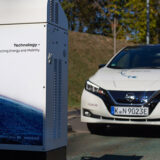
Volkswagen China centralises EV development in Hefei, Anhui
German automaker Volkswagen (VW) is restructuring its electric vehicle (EV) development in China by consolidating its research and development (R&D) operations in Hefei, Anhui province. The Volkswagen China Technology Center (VCTC) in Hefei will now serve as the central hub for battery electric vehicle (BEV) development in the region, shifting much of the focus away from the existing R&D center in Beijing. This move aims to streamline operations and accelerate the development of cost-effective EVs for the Chinese market.
The restructuring will see a significant number of Volkswagen employees transferred to the VCTC in Anhui, with the Beijing center retaining only a few hybrid projects. The centralisation is part of Volkswagen’s broader strategy to enhance its competitiveness in China’s fast-growing EV market, particularly by achieving cost parity with local BEV competitors by 2026.
Volkswagen’s future BEVs in China will be based on two primary platforms: the Modular Electric Drive Matrix (MEB) and the China Main Platform (CMP). The VCTC will lead the development of new vehicles on these platforms, with a focus on incorporating local technologies and meeting Chinese customer preferences. Additionally, Volkswagen Anhui, a joint venture with JAC Motors, will oversee the production of these new models.
The decision to centralise operations in Hefei is also driven by the need to standardise digital architectures and reduce production costs by up to 40% for entry-level compact models. This restructuring underscores Volkswagen’s commitment to its “In China for China” strategy, ensuring that vehicles are both developed and manufactured locally.
The shift towards electric vehicles and plug-in hybrids has accelerated in China, with these vehicles outpacing traditional internal combustion engines in sales for the first time in July 2024, according to the Chinese Passenger Car Association (CPCA).
This transition has been particularly challenging for mass manufacturers like Volkswagen, whose market share in China has fallen from 19% in 2020 to 14% in 2024. Domestic Chinese carmakers such as BYD and Geely have capitalised on the growing demand for EVs, increasing their combined market share to 52%, up from 33% in 2020.














